They’re Never Too Young Or Too Old
Bernard Shaw said that youth is wasted on the young. It may be. But in Hollywood it’s certainly appreciated by the old. Any time is kissing time—and as the old song puts it, love has no rhyme nor reason till man has reached his prime. To prove it, there are dozens of successful marriages in Hollywood in which the man is from fifteen to thirty years older than the bride who was young enough to blush when she said “I do.” Take the case of Liz Taylor: She married Michael Wilding in such a rush it looked as if she were running away from something. She certainly was fleeing from someone—and I do mean Nicky Hilton. They were two lost kids who never found each other. But Mike, old enough to be his wife’s father—if he had married young—has the beautiful brunette adoring him twenty-four hours a day.
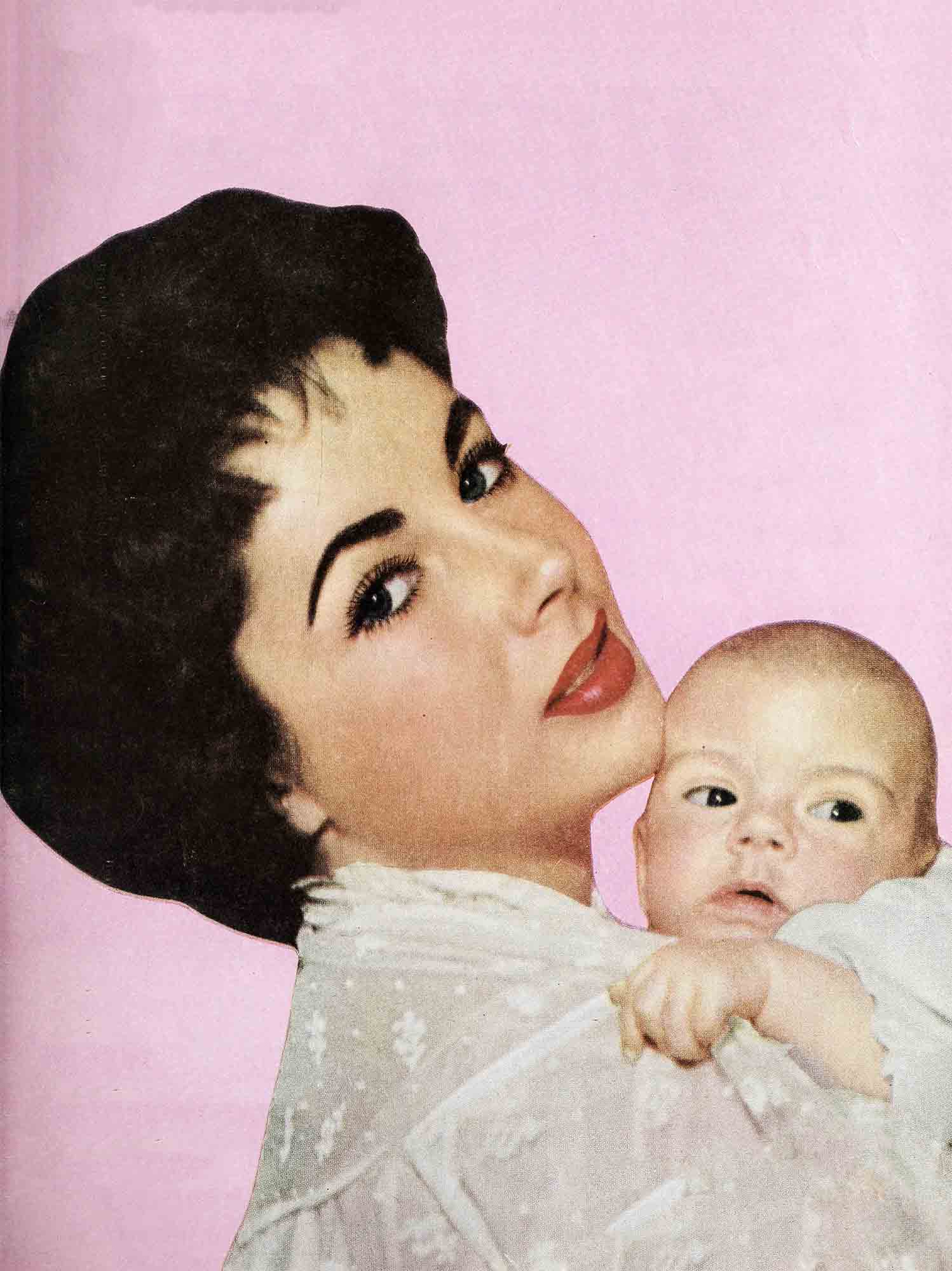
Mrs. Mike used to live for night clubs. Now she lives for Mr. Mike and little Mike. And it isn’t all one-sided. When a friend who was an enemy was saying, “Brother, I wonder what will happen when Joan Crawford makes her picture with Wilding!” a true pal of both flared, “Elizabeth has nothing to worry about—he worships that little girl.” Mike had his fill of older women; in fact he was in a warm romance with gorgeous gramma Dietrich the week before he fell for Lizzie. But now he’s singing it’s so nice to have a girl—a young girl—around the house.
Charlie Chaplin, of course, was the originator of the older Hollywood man and young girl trip to the altar. And he really tripped with Mildred Harris, who I believe was sixteen and Lita Grey, who was fifteen when she fell for the Chaplin allure. Current wife Oona wasn’t much older and she’s still under his spell.
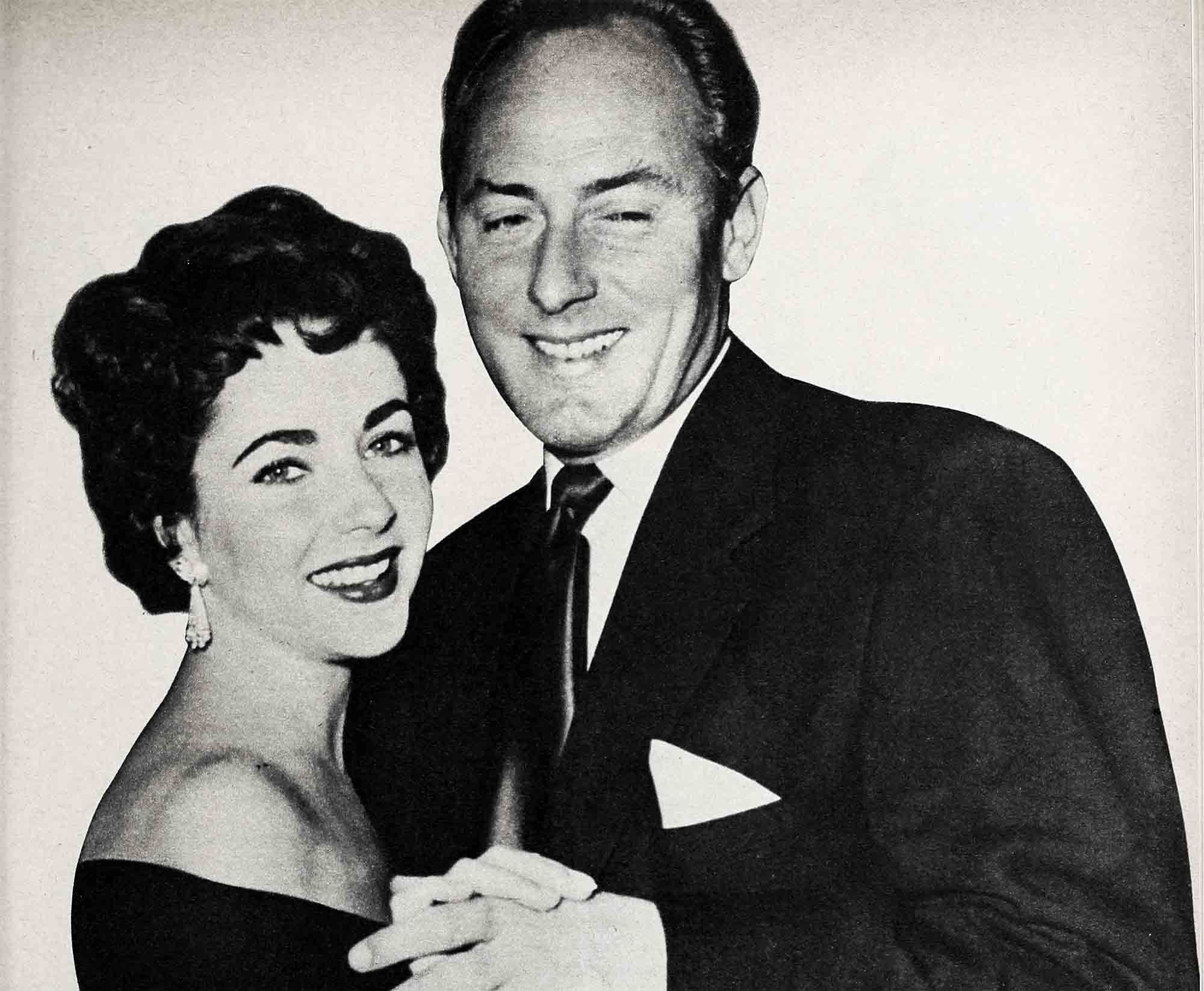
I can understand why the men like to be married to itsy bitsy girls—it’s great for the ego. But the fervor with which some of our younger female marrieds regard their aging mates, frankly has me a bit baffled.
Take June Allyson. When Dick Powell was so ill recently, she lost nine pounds worrying. (She’ll conk me on the head for calling him an aging mate, by the way—but it’s really meant comparatively speaking.) And when he was too sick to attend the preview of “Split Second,” his first directing chore, June subbed for him, and acted like a hen with its first chick, climbing all over people, squatting on her knees, fluttery and nervous until the verdict came in with the applause.
Dick used to treat her like a baby. But not any more. In her own imperceptible way, she’s the boss at home. And it’s hard to believe that Joan Blondell complained Dick was overcareful with his money and when they split they had to divide everything, down to the last kitchen utensil. I guess Joan just didn’t know how to handle him, because he shot the bankroll for Junie—and what a huge estate he just bought for them in Mandeville Canyon!
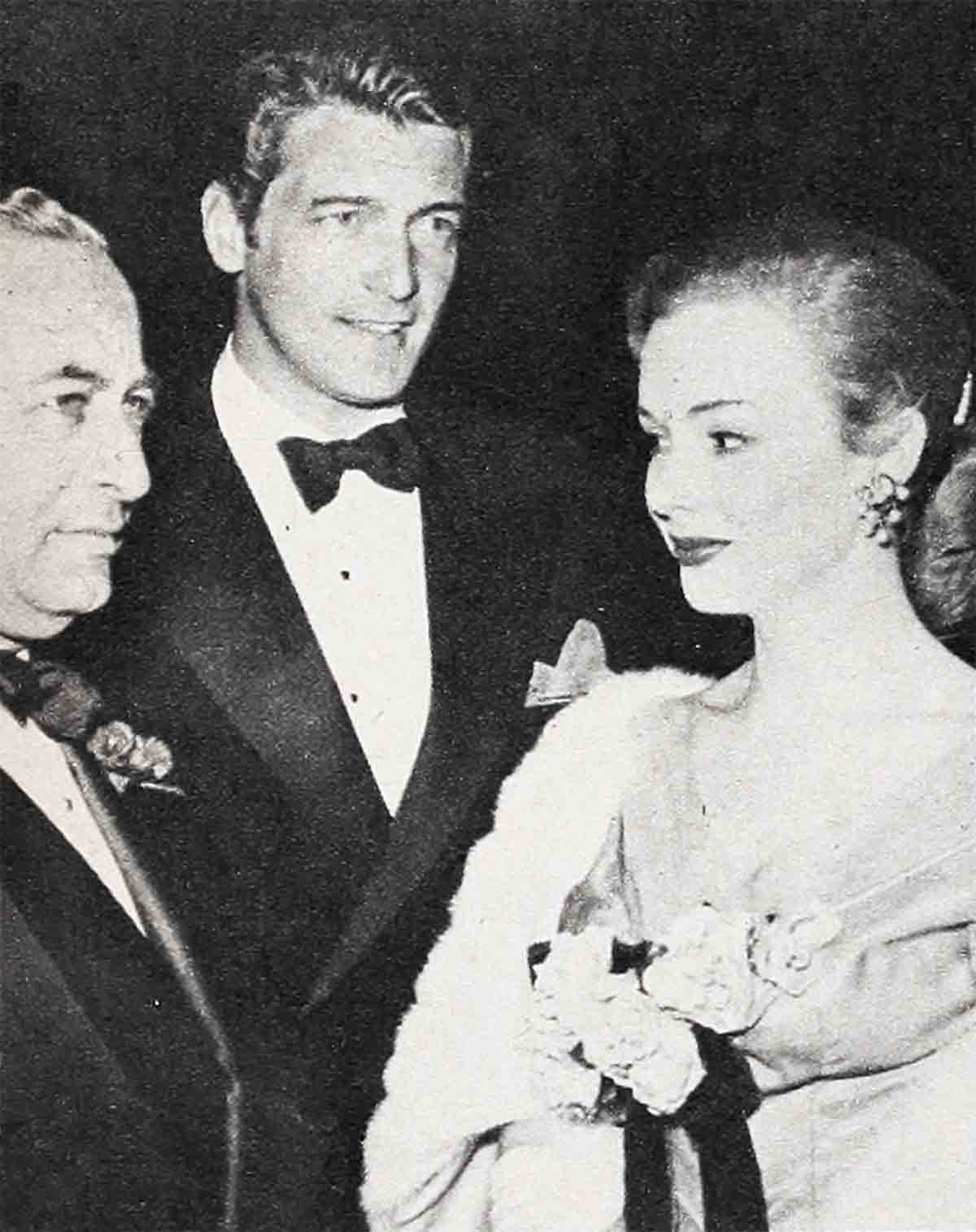
Stewart Granger’s reason for delaying his marriage to Jean Simmons was that he was old enough to be her father; he didn’t put it quite that way, of course, but he was obviously conscious of the gray around his handsome temples. But nothing is more of a come-on to a young female of any species than a delaying tactic based on the age differential. The more the man said “Let’s wait,” the more Jean begged “Let’s not.” But Granger’s a gentleman of the old school and he kept her waiting until she was twenty-one. After a doubtful beginning, they’re shaking down well. She still leans on him madly for the support she doesn’t need, but you don’t hear him bawling her out. And there’s a sort of cosiness about them even when they work together as in “Young Bess.”
It cost Humphrey Bogart $300,000 to divorce Mayo Methot in order to marry Lauren Bacall. Betty isn’t thirty yet. Bogey will never see fifty again. And yet this is one of the most consolidated partnerships in town, in spite of the ridiculous rumor that has Bacall swooning for Adlai Stevenson. She loved his politics, but this clearcut dame has never confused being a Democrat with being in love—although she was able to switch Bogey from Ike to the man of her political choice.
There are no feminine tricks with Bacall. She’s a pal, more than a gal. She was green about everything when she met her Lord and Master in “To Have and Have Not.” How they all ribbed her—Bogart most of all! If Betty had cried or resented it, she wouldn’t now be signing her name Mrs. B.
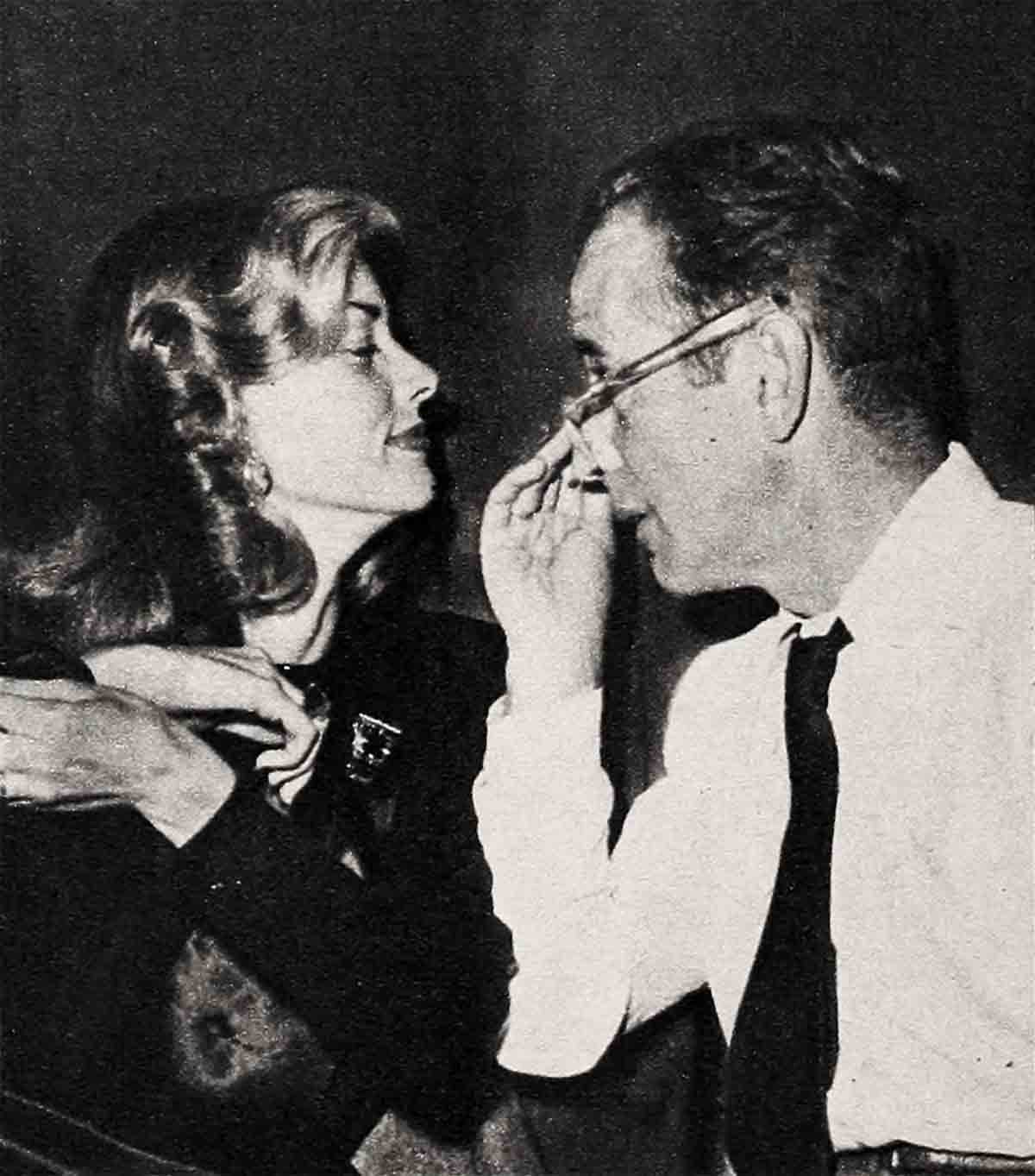
I remember shortly after the marriage, Bogey came home and heard her bawling the pants off the grocer. He pretended to be shocked and told her she had no right to talk to anyone like that. “What was it all about?” he wanted to know. “The man had the nerve,” said Bacall, “to say he’d close our account because we weren’t buying enough with him.” This made Mr. B. mad, naturally, and after consigning the grocer to the hottest place, he inquired, “Oh, by the way, how much did we spend last month?” “I only charged a head of lettuce last month,” said his wife defiantly. He made her write the grocer a letter of apology. She was in awe of Bogey then. I don’t think she’d write that letter now.
Bogart is another husband who hates to spend money unless he absolutely has to. But his young wife got him to buy Hedy Lamarr’s hilltop snuggery for $100,000, and after last year’s flood marooned them, she used witchery or hypnotism to make him come across with $200,000 for their present Holmby Hills palace next door to the Alan Ladds. Betty, incidentally, has always been shocked by a free and easy approach to marriage. “I can’t understand it,” she once told me. “If I marry, it’s for keeps.”
David Selznick can give Jennifer Jones a good twenty-five years, and he used to give her you-know-what in the early days of courting. David was never an all-for-one-woman man, but Jennifer has never been able or willing to cope with more than one at a time. So when David flirted with girls at parties, she’d flounce out and be home before he could say, “I’m sorry.”
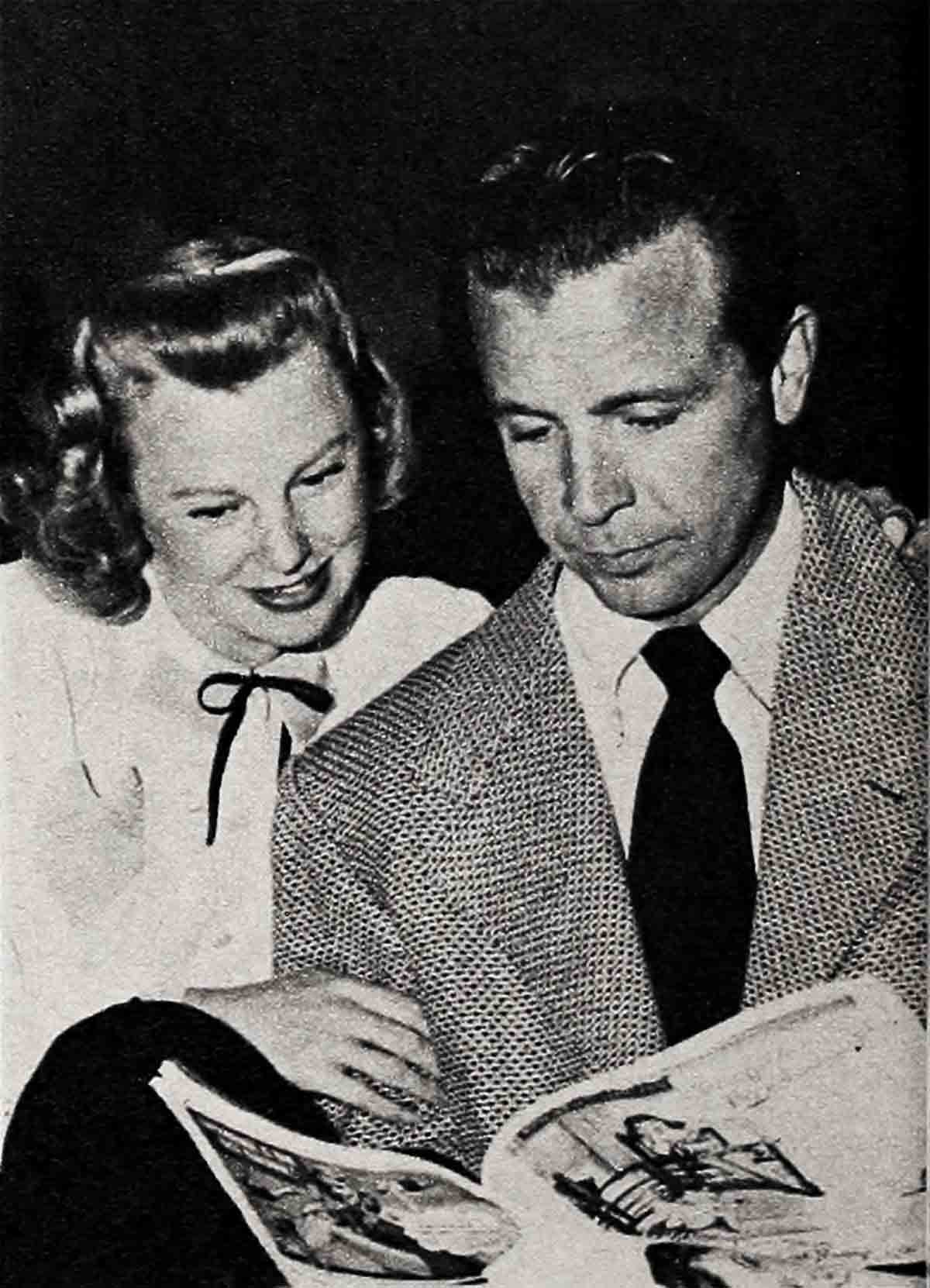
This running-away tactic served her as well as it did Mr. Granger. When she flew to Switzerland, David O.’s plane was right on her tail. And that’s how it’s been ever since. He adores her so much he’s a nuisance, sending dozens of memos to the producers of her pictures, and guarding his bride from the press as if she were the Hope diamond or something.
Selznick has been accused of coming between Jennifer and the late Robert Walker. No one can break a good marriage. But David was someone she could turn to when poor Walker was unable to cope with her growing success. David was a rock, albeit a crude leaning post—and about as subtle as a Mack truck when it comes to women. But the marriage looks good from this distance.
Mike O’Shea is forty-seven. Wife Virginia Mayo is twenty-six. But if you know of a bigger success than this marriage, don’t tell me. I don’t know any other wife who’d pay, cheerfully or morosely, $25,000 of her own money to her husband’s former wife. Sure the judge made her, but some marriages might have cracked under the strain. This mating was made in Hollywood, but it looks like heaven. And more like heaven than ever, now that there’s a young O’Shea on the way.
Haven’t heard too much from Joan Caulfield since she married Frank Ross, at least fifteen years her senior. Frank used to be married to Jean Arthur, and I imagine he’s much nearer fifty than forty. He and Joan live very well in a big house on a high hill in Beverly; they are neighbors of the Edgar Bergens, who, by the way, is some twenty-odd years older than his wife. Joan is now starring in television, Frank will have completed “The Robe” in CinemaScope, by the time you read this and the Sun is Shining.
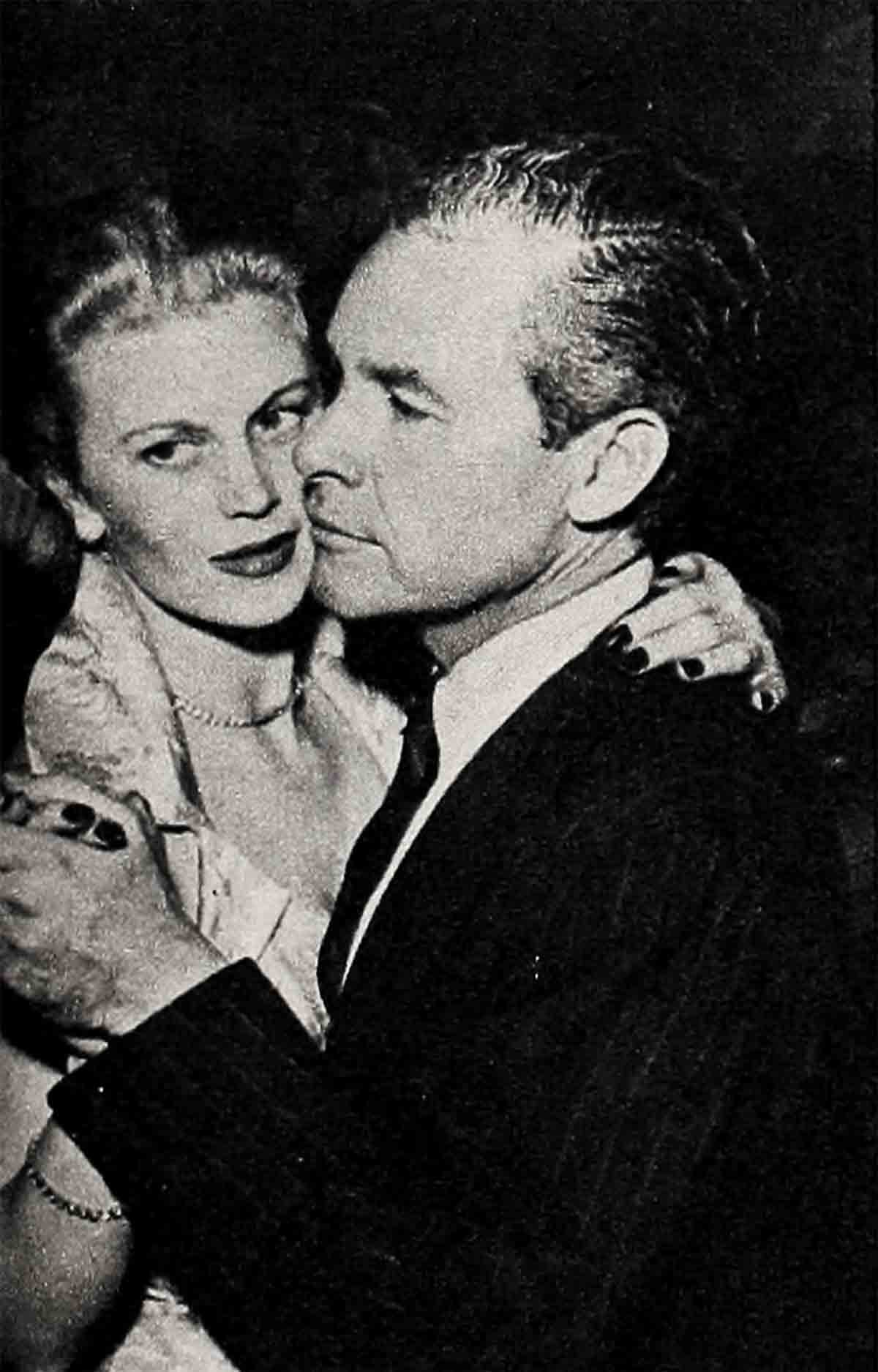
Cary Grant wasn’t happy with the wives who were near his own age. But Betsy Drake, twenty years his junior, is getting along all right. Apparently she can do no wrong. She was clever before she hooked he guy—careful to give no hint of the impending nuptials, because that’s how a lot of girls didn’t take Grant. She was fey and always too embarrassed to talk. But she had a wonderful sense of humor, and when a magazine writer wanted a story on her wedding she started by limiting the replies to Yes and No. When he pressed for elaborate details, she stopped him with, “How much does your magazine sell for?” “Fifteen cents,” he told her. “For fifteen cents,” bubbled Betsy, “I don’t think your readers are entitled to come into Cary’s and my bedroom.”
They recently took a trip half way around the world, and prepared for it at Betsy’s suggestion by attending every lecture and travelogue in town dealing with faraway places. She has never cared for night clubs, which younger wives sometimes miss when the old man wants to get out the slippers and / or go to bed. She doesn’t like dressing up, although pre-marriage Cary dated some of the best-dressed females in town. And how she did it, no one knows, because above everything, Cary was proud of his bachelor-style home, but he gave the young missus carte blanche to do the whole place over. And it was Betsy who discovered the beautiful paneling under the coats of paint; she and Cary spent every minute scraping the stuff themselves—with or without guests around.
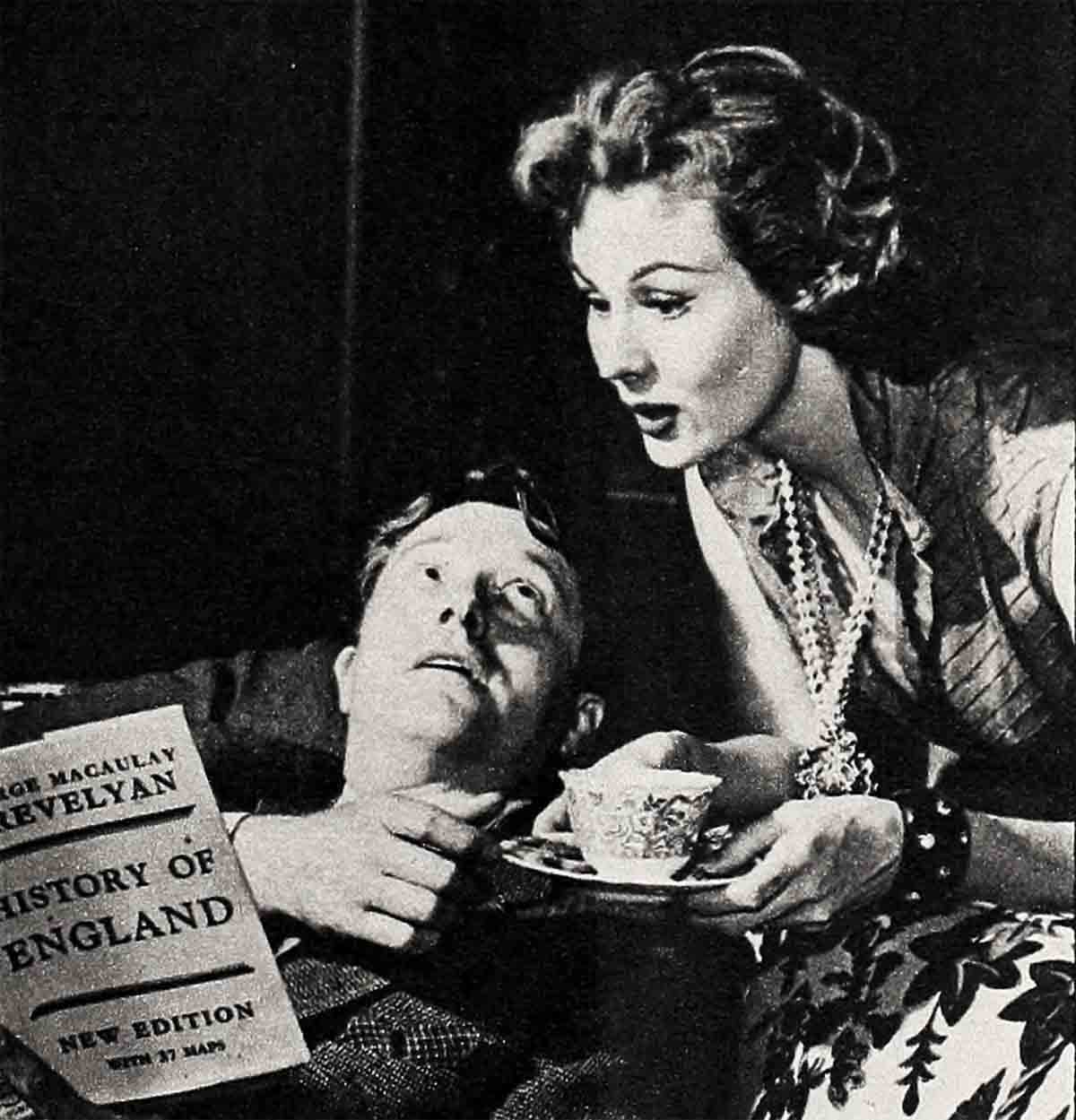
Even when she took over his ill-fated radio series based on the “Mr. Blandings Builds His Dream House,” the marriage stood firm while the network rocked. All they need to be a million per cent happy, is a baby. And maybe they’ll adopt some kids if heaven doesn’t bless them with their own.
So far, so successful. But of course the May-December love songs sometimes hit a sour note. Olivia de Havilland and elderly Marcus Goodrich, for instance. Olivia was a character in search of a father. She didn’t see much of her own dad—he married a Japanese girl following his divorce from her mother. And she always went for older men, including Jock Whitney and John Huston; she was so in love with the fascinating Mr. Huston. And she fell like a ton of bricks for Goodrich, who was a greater disciplinarian than the papa in “The Barretts of Wimpole Street.”
The story goes that Goodrich even wanted Livvy to be billed as Mrs. Marcus Goodrich in “Romeo and Juliet,” which would have surprised Shakespeare, but not anyone who knew de Havilland’s husband. Another story has it that when a letter was delivered to the house addressed in her maiden name, Marcus sent it back unopened with the message that only Mrs. M. Goodrich lived there. It’s a fact that when friends of his fifth wife called, they had to pass through him to reach her.
There was also the story that Marcus was holding forth at tea one afternoon and when the phone rang and she jumped to answer, he screamed, “Don’t you know you don’t talk on the telephone when I’m talking?” Hard to believe all the stories, but with so much gossip there must have been some truth. My heart really broke for Olivia. She wanted so badly to make good in the love department. Hope she has better luck next time.
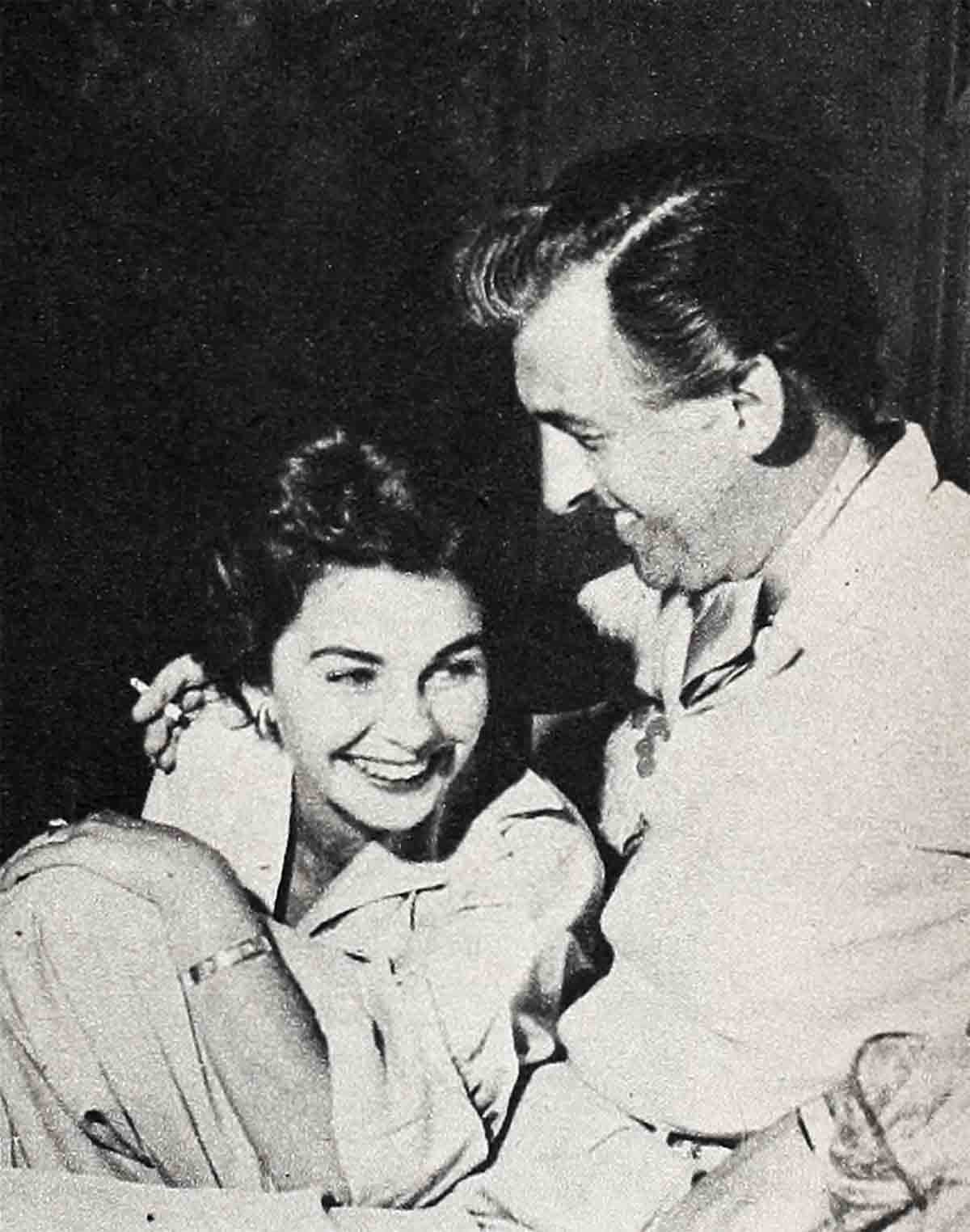
Often in an unhappy marriage, the young wife has more courage to break it up after the arrival of a child. That’s how it happened with Olivia. And the same for Linda Darnell, who pursued Pev Marley when she was fifteen until she chased him into the wedding circle. But their adopted daughter wasn’t very old before Linda decided she’d been chasing a dream that hadn’t come true.
Piper Laurie is twenty-one. Len Goldstein, the producer, is forty-nine. He has always insisted that his feelings for the former flower eater are strictly platonic. And I’m finally beginning to believe him, because Piper is going more for men of her own age, like Carlos Thompson. And she wants to marry, which Len doesn’t.
Pier Angeli wants to marry too. But there is nothing paternal about how Kirk Douglas feels about her. And she’s crazy about him. There’s about seventeen years’ difference in their ages. But, says Pier, “Years have nothing to do with how you’ve lived inside. I look very young, but I have been through a war and know suffering.” She’s dashing to Europe this summer for “The Flame and the Flesh,” and she’ll see Kirk, of course, and maybe call his bluff on the marriage front.
Wherever Pier went her mama was sure to go. But the little Angeli is twenty-one now, and the day after her last birthday, she stamped her foot and told her mother, who absolutely cannot stand Kirk, chiefly because she thinks he’s too old for her darling daughter, that from now on she’ll run her own life. Which makes it a bit tough for her twin, Marisa, because mama has transferred all the supervision to her.
It’s hard to imagine Pier marrying Kirk or anyone, she still looks like such a baby. When my little daughter, Wendy, first saw her with Kirk at Jack’s at The Beach, she asked me, in the loudest whisper, “Mama, is she a girl or a woman?” I replied, “Something in between.”
Then there’s Bing Crosby and Mona Freeman. Bing is in Europe; Mona was getting ready to go there when a picture assignment reared its imperative head and the studio nixed the trip. Mona beefed for years that no one would take her seriously as a grown-up girl, even though she was married and had a daughter. If she marries Bing, who is twice her age, she’ll have no more problems on this count. Or even if she doesn’t marry him. It’s a romance all right. But whether the durable type, only time will tell.
Then there’s the other side: older wives, younger husbands. After Ginger Rogers married Jacques, a cat meowed, “Glamour actresses now have to watch their girlish figures and boyish husbands.” But I’ll match Ginger’s physique against any twenty-year-old chick’s . . . Brenda Marshall is older than Bill Holden but this is probably the most successful marriage in town. . . . Eleanor Powell can give Glenn Ford a few years, but they’re doing fine now. . . . Bette Davis is quite a bit older than Gary Merrill, but if she ever gets discouraged, she can think of the great Victorian statesman, Disraeli, whose bride was born a quarter of a century before him, and he never ceased praising her as the inspiration for his career and happiness.
So I guess it adds up to this—age has absolutely nothing to do with it. You’re never too young or too old. If you’re in love you can as old as Methusela—or as young as Juliet.
(Liz Taylor will be in “Elephant Walk,” June Allyson in “Remains to Be Seen.” Lauren Bacall stars in “How to Marry a Millionaire,” and Virginia Mayo’s next is “Arizona Outpost.”)
It is a quote. PHOTOPLAY MAGAZINE JULY 1953




